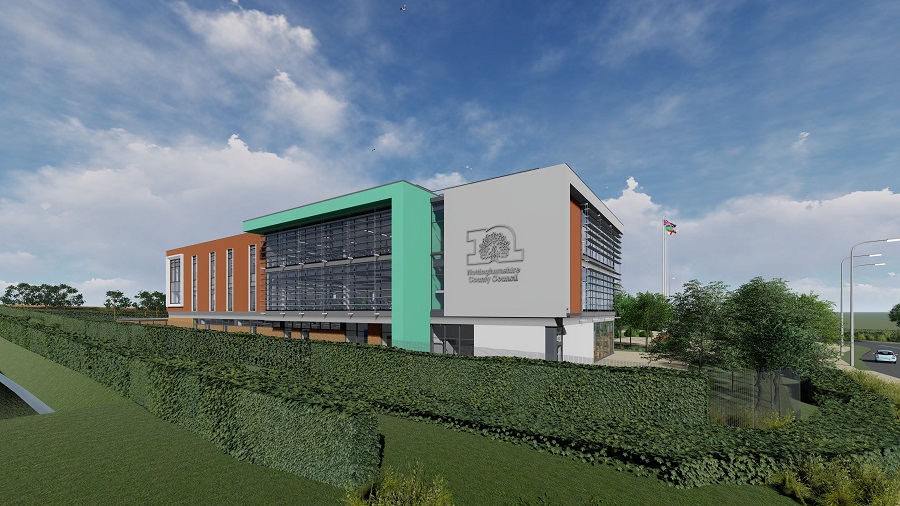Nottinghamshire County Council has voted to move its civic and democratic base to a new building near Hucknall to bring long-term savings for the taxpayer and environment.
The decision comes off the back of a review which has found that it is no longer practical to keep the building, which opened in 1946, as the Council’s main base in the long-term, as it will be too expensive to maintain and improve to meet the Council’s environmental ambitions. With the rise of home working, the building also is now too large for the Council’s needs.
County Hall costs more than £1.7m to operate and maintain each year and requires essential maintenance costing more than £30m over the next 12 years, with up to a further £28m needed to bring the building up to modern environmental standards.
The Council’s new low carbon, all-electric office near Hucknall, which has already had full planning permission, will be the new home of the council’s civic, democratic and leadership functions after being approved at yesterday’s Full Council meeting (13 July).
Construction will start later this year and should be completed by winter 2024/25. The building is also earmarked to be the new home of two key council front line services, the Multi Agency Safeguarding Hub (MASH) for vulnerable children and adults, and the council’s customer service centre, which handles all public enquiries.
Nottinghamshire County Council Leader, Councillor Ben Bradley, MP explains: “County Hall is an old building which is too expensive to operate and maintain and would cost tens of millions of taxpayers’ money to make it viable for the future, which we of course can’t justify. We want to spend that money on public services, not on running office buildings.
“We are looking to the future. This move will help ensure that we have sustainable finances, and also mean that the decision-making function of this Council is based in the very heart of our county. That will help to bring jobs, skills and investment into the Hucknall area.
“It’s still too early to comment on the future of County Hall, but we will be speaking to our staff and partners about all the options for the future. Being an iconic Nottinghamshire landmark with a riverside location along the Trent, makes it a very attractive site. But whatever happens, its heritage will be respected.”
Nottinghamshire County Councillor Keith Girling, Cabinet Member for Economic Development and Asset Management, said: “We have to make this decision and investment now to save taxpayers’ money in the long run.
“Like other councils in the county and the region, we are faced with a decision to leave a building which has been synonymous with the Council for many decades but is no longer fit for purpose.
“County Hall is often only around a third full, so it is not being used to its full potential, with many of our staff continuing to work productively from home which adheres to our hybrid model of working.
“We have looked into all the options and none of our current buildings have the potential to host a public meeting space or facilities needed for our democratic and civic functions.
“We already had plans for new, low carbon buildings near Hucknall for front-line services, so it makes sense to update the designs to also accommodate a wider civic function ahead of these offices being built.
“We will continue to have a major base in West Bridgford as we have no plans to move out of Trent Bridge House.”
Due to inflation, rising costs in the construction industry and additional design costs to potentially incorporate the civic and democratic function, the office building near Hucknall is now estimated to cost £18.3m.
Councillor Keith Girling added: “This project is good value. We will save significant sums on running costs in the new building compared with County Hall, and, of course, by looking at future options for County Hall, we’ll save more than £50m in maintenance and refurbishment costs.”
The new building will be all-electric and built to standards which will rank the building within the top 10 per cent of new UK (non-domestic) buildings in terms of environmental sustainability.
Thanks to a low carbon design, high insulation levels and heat absorbing features, heating bills will be kept as low as possible. This design will also help keep the building cool in the warmer months, so no air-conditioning will be installed. Rooftop solar panels will also help generate electricity.
These plans are part of a wider buildings’ programme which aims to save taxpayers’ money by creating more carbon-neutral council buildings, generating income by leasing older buildings with higher running-costs and co-locating with other public organisations.
The new office is being designed and managed by Arc Partnership and delivered through Arc’s construction partner, Balfour Beatty.



